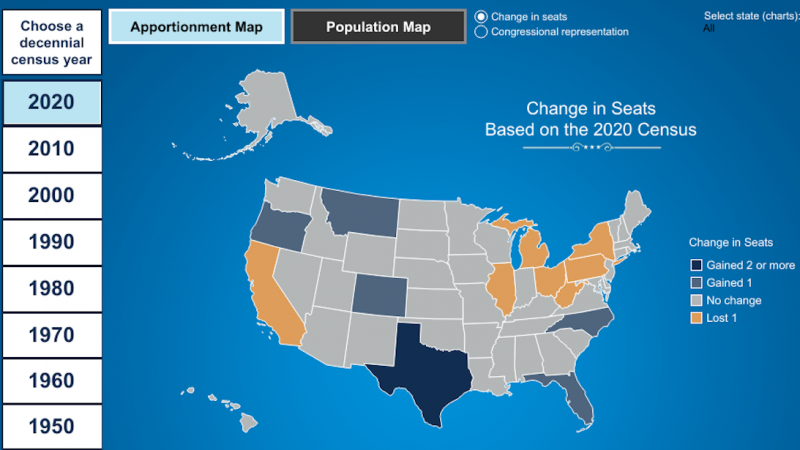Alabama Avoids Loss Of Congressional Seat With Slight Population Gain
Alabama avoided the loss of a congressional seat as its population grew from 4.8 million in 2010 to 5.03 million last year, according to figures released Monday by the U.S. Census Bureau.
State officials had feared Alabama would lose one of its seven seats in the U.S. House of Representatives and one of its nine Electoral College members, based on the 2020 census.
The census is taken every 10 years, and the 435 seats in the House are apportioned according to the population of the states. The Public Affairs Research Council of Alabama released an analysis in January, predicting Alabama would keep its seven congressional seats and that New York would lose one seat.
That’s what will happen, based on the population count released Monday.
If New York had counted just 89 more people than the 20,215,751 final figure, it would have held on to the House seat, according to The New York Times. Instead, the size of New York’s delegation will drop by one to 26. Minnesota currently has one House member, and it will gain a second.
The distribution of the population nationally is important because census figures are used to distribute federal money among the states, as well as representation in the Electoral College. The Census Bureau said more than $675 billion in federal money is spent annually — based on population of the states — on schools, hospitals, roads, public works and other programs.
Gov. Kay Ivey said Alabama’s success in the census “was certainly a group effort across the state, and I offer my heartfelt thanks to everyone who played a part.”
Among key successes cited by Ivey in the 2020 responses were:
- Higher self-response rate than in the 2010 Census
- 47 of the state’s 67 counties exceeded their final 2010 self-response rates
- Many Black Belt counties performed at or above 2010 levels
The release of data pertains only to statewide population totals. Figures for counties and cities will be released later.
The Alabama Department of Economic and Community Affairs took over the state’s Census count efforts in 2017 as the state geared up efforts to encourage people to participate in the census.
“This was by far the most time and resources that Alabama state government has ever given toward a census count, and I am happy that our efforts and hard work have paid off,” said Kenneth Boswell, chairman of Alabama Counts! Committee and ADECA director.
Alabama House Speaker Mac McCutcheon, R-Monrovia, has said he expects a special session of the Legislature this summer on legislative redistricting, based on the distribution of the population within Alabama.
The Alabama Legislature is made up of 35 seats in the Senate and 105 in the House of Representatives. Those districts are realigned every 10 years, based on population shifts reflected by the Census.
Once praised, settlement to help sickened BP oil spill workers leaves most with nearly nothing
Thousands of ordinary people who helped clean up after the 2010 BP oil spill in the Gulf of Mexico say they got sick. A court settlement was supposed to help compensate them, but it hasn’t turned out as expected.
Q&A: How harm reduction can help mitigate the opioid crisis
Maia Szalavitz discusses harm reduction's effectiveness against drug addiction, how punitive policies can hurt people who need pain medication and more.
The Gulf States Newsroom is hiring a Community Engagement Producer
The Gulf States Newsroom is seeking a curious, creative and collaborative professional to work with our regional team to build up engaged journalism efforts.
Gambling bills face uncertain future in the Alabama legislature
This year looked to be different for lottery and gambling legislation, which has fallen short for years in the Alabama legislature. But this week, with only a handful of meeting days left, competing House and Senate proposals were sent to a conference committee to work out differences.
Alabama’s racial, ethnic health disparities are ‘more severe’ than other states, report says
Data from the Commonwealth Fund show that the quality of care people receive and their health outcomes worsened because of the COVID-19 pandemic.
What’s your favorite thing about Alabama?
That's the question we put to those at our recent News and Brews community pop-ups at Hop City and Saturn in Birmingham.








